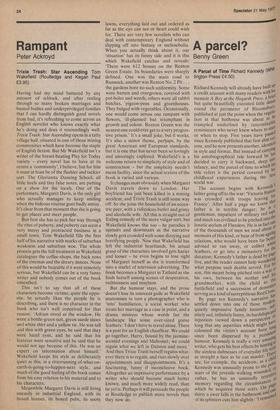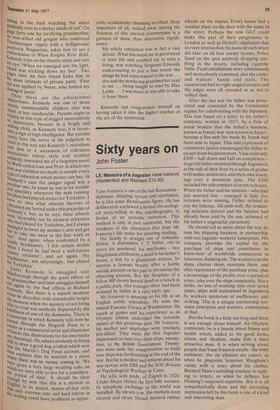A parcel?
Benny Green
A Parcel of Time Richard Kennedy (Whittington Press £4.50)
Richard Kennedy will already have built
a credit account with many readers with hist memoir A Boy at the Hogarth Press, a brie' but quite beautifully executed little dance round the perimeter of BloomsburY' published at just the point when the veget3 lion in that hothouse was about to be trampled underfoot by interminable rem iniscers who never knew where to stardt or when to stop. Five years have passe,
since Kennedy published that first slim ume, and he now presents another, identl.c3'
in style and format. But instead of carrYllig his autobiographical tale forward he decided to carry it backward, deep ta'' infancy, and the parcel of time to whichll!s title refers is the period covered by childhood experiences during the hrs' world war.
The account begins with Kenneq's father going off to the war: 'Victoria Station
was crowded with troops leaving f01; France'. After half a page we know tila father is in terrible danger; he is ; gentleman, impatient of military red and much too civilised to be pitched into lunatic asylum of Flanders. He is in fact or.i„e of the thousands of men we read abobt. memoirs of this kind, or hear of from agel relations, who would have been far bett.,e advised to run away, or collect feathers, or go into a monastery for t"e duration; Kennedy's father is dead by
five, and the reader cannot help wonder'n.r:
what purpose such deaths served. For hi; son, this meant being Pitched into a warifis his own, between his mother and ",:e grandmother, with the child as t".cs battlefield and a succession of domes° serving as a kind of surreptitious Red Cross's By page ten Kennedy's narrative bat settled down into one of those mocl.es; quietly impressive family histories, In rj mtelysad, infinitely funny, its hardships °O injustices viewed down a perspectivke:ve long that any asperities which might "rig coloured the victim's account have since been dispersed by a Persisteies humour. Kennedy is really a very amus:et writer, who gets his best effects by hintittg.rb the aimless daftnesses of everyday life,,,wpIre as straight 2:1. face as he can muster. 7.0 are, for example, the accidents; as a c'tity Kennedy was unusually prone to the Pe or scars of the juvenile walking wound0 rather, he has an unusually retell° memory regarding the circumstances e which he acquired those scars. On 1,,le thirty a ewer falls in the bathroom ano."ed of its splinters cuts him slightly: 'I remain sitting in the bath watching the water gradually turn to a darker shade of red'. On Page forty-one his terrifying grandmother, an iron-willed old gorgon who combined Thurberesque vagary with a belligerence Positively Wagnerian, takes him to see a Performance of When Knights Were Bold. Kennedy trips on the theatre stairs and cuts 1,1_is eye: ''When we emerged into the light, ulood was trickling down my face'. Two Pages later his best friend kicks him in the Most intimate of private parts: `First aid was applied by Nurse, who bathed my damaged penis'. Then there are the educational Misfortunes. Kennedy was one of those utterly commendable children who was More or less uneducable. Parents ought to rejoice in this type of dogged unreceptivity to instruction, because in a bright and Willing child, as Kennedy was, it is invariably a sign of high intelligence. But parents rely have the nerve or the judgment to react in this way and Kennedy's custodians sent him to a succession of ridiculous institutions whose style and number sbuddenly reminded me of a forgotten novel Y Wells called Joan and Peter in which two tPost-war children are made to sample every eee of education which money can buy. In tlitedY's case the danger signal was a Peculiar one; he knew he was in for trouble thnd quackery whenever the man running hne Place had played cricket for Yorkshire. I e,-ve no idea what obscure theories of ti-'ucation are buried under this prejudice of w'ennedy's, but, as he says, these schools weLre 'invariably run by amateur cricketers niu° had played for Yorkshire, but I always h anag.ed to twist my mother's arm and get twer to take me away in the first week or k.°‘, Arid again, when confronted by a ,a1,,?(Ily headmaster, 'I felt certain doubts 'len I heard he had been a well-known 'hq_linty cricketer': and yet again, 'the .,!adrnaster or Yorksh , not surprisingly, had played ire''. Mter Kennedy is smuggled into ariborough through the good offices of olus grandmother and later smuggles himself tagain by the bad offices of Richard miennedy, But there is a superb moment then he describes with remarkable insight abe, Moment when the mystery of not being ki_le to read was suddenly dispersed by the Tiiiness of one of the domestics. There is ' ,,,stscript in which Kennedy tells how he assed th ear„ rough the Hogarth Press to a of books as a commercial artist and illustrator are (his illustrations for his own books aim charming). He admits modestly to being hi e t° draw a good dog, a talent which won tkm the Martin's Dog Food account, and wili_en explains that he married at a point wneere there was no money coming in: 'We whre given a very large wedding cake on hi:eh we were able to live for a considerae: Period of time'. It should be clear En:ugh by now that this is a memoir so th in its muted, matter-of-fact style that only extreme care and hard labour in C Writing could have produced so appar
ently accidentally charming an effect. Most important of all, tucked away among the flounces of this ancient counterpane is a garland of more than decorative significance: My .whole education was in fact a vast detour. What has stood me in good stead in later life and enabled me to earn a living, was watching Sergeant Edwards endeavouring to put a line round the things he had experienced in the war. . . this and the stories my grandmother read to me . . . being taught to read by Miss Leslie. . . I was more or less able to take it from there.
Kennedy can congratulate himself on having taken it into the higher reaches of the art of the memoirist.



































 Previous page
Previous page